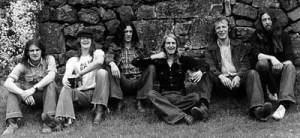Martyn Wylde performing Kate Rusby’s song “A Rose In April” at the Luna Star Cafe in North Miami, Florida on 18 October, 2013.

Martyn Wylde performing Kate Rusby’s song “A Rose In April” at the Luna Star Cafe in North Miami, Florida on 18 October, 2013.

Silly Wizard was a Scottish folk band formed in 1970 in Edinburgh. The founding members were Gordon Jones, Johnny Cunningham and Bob Thomas.Thomas credited the name “Silly Wizard” to a roommate who was writing a book of children’s stories, and the group first performed under that name in the summer of 1972.

With the additions of Andy M. Stewart as lead vocalist (and composer of classic songs like Queen of Argyll and Ramblin’ Rover), Johnny’s brother Phil Cunningham on accordion and Alastair Donaldson on bass, the group recorded their first album – Silly Wizard.
Silly Wizard played a variety of Scottish folk music – jigs, reels, and airs along with original tunes and songs. “Contemporary music that is firmly based in tradition,” was how one reviewer put it.
Stewart told Dirty Linen Magazine in 1991, “I think that it’s the general love of traditional music, interest in songs, and interest in things, not just Scottish music; certainly a big interest in Irish music and songs, which accounts for my interest, I think, across the board…”
Dougie MacLean, who had once been in a band with Andy Stewart, was a member of Silly Wizard for about six months, contributing to their fourth album, Wild & Beautiful.
They continued touring and recording until the late 1980s, weathering numerous personnel changes, when the band decided to dissolve after performing for seventeen years and releasing nine albums.
In December 2012, Silly Wizard was inducted into the Scottish Traditional Music Hall of Fame, and a remastered album of a 1983 concert in Cambridge, Massachusetts, Live Again, has just been released.
Scarborough Fair became one of the most well known of folk songs due to the 1966 recording by Simon and Garfunkel which became a hit record worldwide, and which was included in the soundtrack of the film, The Graduate. Documented versions of the song are known to have existed as early as 1650 and it is generally considered to be a variant of the traditional English folk song The Elfin Knight (Child Ballad No. 2).
Recordings
The melody later developed by Simon & Garfunkel in Scarborough Fair/Canticle was first recorded on a 1956 album, English Folk Songs, by Audrey Coppard (Smithsonian Folkways). Ewan MacColl performed the song with Peggy Seeger on their 1961 album, Classic Scots Ballads. It was then recorded by British folk legend Martin Carthy (the first British folk singer to be awarded an MBE by Queen Elizabeth II) on his first solo album in 1965. Paul Simon heard the Carthy version on a visit to Britain in that year.
Simon, interviewed in the July 2011 edition of Mojo magazine: “The version I was playing was definitely what I could remember of Martin’s version, but he didn’t teach it to me.” Although the arrangement of Scarborough Fair recorded by Simon and Garfunkel was almost a note-for-note copy of Carthy’s (with the addition of “Canticle”, the counterpoint vocal), neither Carthy nor the Child designation were credited on the recording. A monetary settlement with Carthy was made decades later, and Carthy and Simon finally buried the hatchet by performing the song together at the Hammersmith Apollo in 2000.
Lyrics
Scarborough Fair tells a tale of a young man who asks his former love, through an intermediary, to perform a series of seemingly impossible tasks, such as making him a shirt – “tell her to make me a cambric shirt without no seam” – and then washing it in a dry well, adding that if she completes these tasks he will take her back. When sung as a duet, the woman then gives her lover a series of equally impossible tasks, promising to give him the seamless shirt once he has completed them.
The oldest versions of “The Elfin Knight” (circa 1650) contain the refrain “my plaid away, my plaid away, the wind shall not blow my plaid away”. Some more recent versions often contain one of a group of related refrains:
Sober and grave grows merry in time
Every rose grows merry with time
There’s never a rose grows fairer with time
These are usually paired with “Once (s)he was a true love of mine”. “Parsley, sage, rosemary, and thyme” may simply be an alternate rhyming refrain to the original.
According to Arnold Rypens, “all these herbs used to symbolize something: rosemary stood for perseverance, thyme for fecundity.” Sage is often carried or burned for protection. Martin Carthy says all the herbs mentioned were closely associated with death and that when combined they might work as a charm against “the evil eye”.
Here’s a link to Martin Carthy’s original version of Scarborough Fair from his 1965 album titled Martin Carthy, which is included on his “greatest hits” album, The Definitive Collection.
References:
http://mainlynorfolk.info/martin.carthy/biography.html http://www.watersoncarthy.com/id22.htm http://www.afolksongaday.com/2013/03/24/scarborough-fair http://en.wikipedia.org/wiki/Scarborough_Fair_(ballad) http://www.originals.be/en/originals.php?id=5353 http://en.wikipedia.org/wiki/Martin_Carthy